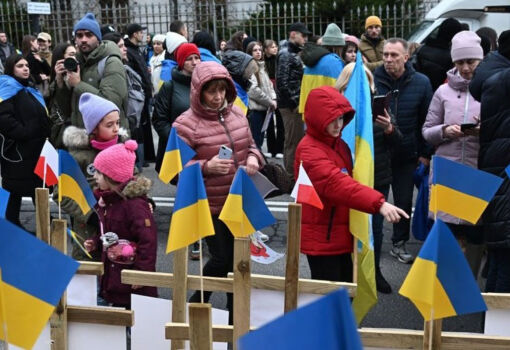
Alla Revenko
Today, on domestic marketplaces, a basic set of school clothes for elementary school girls (polo shirt or blouse, vest, skirt, sundress or dress) costs at least 1000 lei. A little less – for boys. On international sites – three or even four times cheaper. However, it is necessary to order now, taking into account the delivery. But how, if the money will be only after the 4th? The cheapest shoes cost from 280 to 1000 lei, and backpacks – from 300 lei and more, up to 2000 lei and more, depending on the model. It is difficult and scary to imagine how much flowers will cost on September 1.
According to the National Bureau of Statistics, at the end of 2024, the average monthly consumer expenditures per person in a family with one child amounted to 4,603.6 lei, in a family with two children – 4,156.6 lei, with three and more – 2,749.5 lei. That is, the more children there are in a family, the less each of them gets. In the second half of the year, the gap becomes even bigger, also due to the costs of education.
Opposition MPs proposed to provide financial aid in an amount three times higher than the one approved by the authorities. According to the draft law, this assistance should have amounted to 3,000 lei. The implementation of this measure would have required 1 billion lei.
“A family with one child spends on average 1.7 times more per person than a family with three or more children spends on each child. The state is obliged to offer the widest possible range of incentive measures that can support the desire of citizens of fertile age to give birth and raise children in Moldova,” said opposition MP Alla Daranova.
This opposition bill predictably failed to pass.
Many people criticized the “ride of unheard-of generosity” in a thousand lei. First of all, because it is a spoonful of money – on Monday, September 1, a child should already go to school with a new satchel, new shoes and a new suit. And so, they say, this is nothing but a handout before the elections on September 28.
Maia Banarescu, former People’s Advocate for Children’s Rights, believes that assistance should be provided on a case-by-case basis, depending on the income of a particular family.
“My opinion – this is not enough, and the needs of each child are not taken into account. Someone wears a backpack for 1000 lei and doesn’t need this money, so why should he be given this thousand? And another one needs a suit, other clothes, a backpack, etc. Such benefits should be given based on the real needs and income level of the family, rather than paying the same amount to everyone. In my opinion, this gesture looks like a pre-election handout”.
Since nobody has canceled the issue of class segregation yet, it raises doubts: how justified is the aid of 50 euros for parents of pupils of a well-known international school in the capital, where, according to the official website of the institution, a year of education costs from 5.5 thousand to 13.5 thousand euros? On the other hand, there are no alien children for the state.
So, textbooks are also issued for use according to the principle of equality: all schoolchildren in grades I-IX receive them free of charge according to the law – in all educational institutions, regardless of ownership and legal status. Back in 2020, in fulfillment of the Constitutional Court’s ruling that renting textbooks in gymnasium classes is unconstitutional, the Parliament adopted the relevant law. However, pupils in grades X-XII, including those who are covered by the vocational education system, in which lyceum education is also implemented, still pay for the use of textbooks. The price is set for each title as a fraction of its value for the corresponding year: the “shabbier” the book, the cheaper its rent. The first year of use (a new textbook) – 28% of the price, the second year – 25%, the third – 20%, the fourth – 15%, the fifth – 12%.
Alla Revenco, co-founder of the Public Association “Solidary Parents” (“Părinți Solidari”), notes that the government’s initiative to give everyone 1,000 lei is commendable, but it should be permanent. Moreover, families with children could save thousands of lei if they did not have to pay all kinds of fees.
“The decision to provide financial assistance in the amount of 1,000 lei to every pupil from the first to the ninth grade is definitely a positive initiative. But I would like it to be permanent, not only in this election year. Issuing this aid starting from September 4 is perplexing, because it is too late for preparing a child for school. Therefore, this aid should arrive to the family at least until August 20, so that parents have time to use it at the most necessary moment. Especially those who need this money the most.
I would also like to note that the government and other state agencies, in addition to this aid, could significantly help parents if they really fight corruption in schools and kindergartens. This will allow families with children to save more than one thousand lei, which they have to pay in the form of illegal fees to different funds – class, school, kindergarten and so on. or for the payment of the after-school group, or for additional notebooks required by the elementary school teachers,” Alla Revenco shared with Logos Press.
The deadline for receiving the sum of 1 thousand lei is December 26, 2025. After this date, the payment will stop and the recipient will lose the right to financial assistance for the respective year. The National Social Insurance Fund will keep records of all payments made.
Natalia Afanasievna, a teacher at the Chisinau State Lyceum, states that class teachers give parents all the necessary information:
“Everyone who needs money by September 1 ‘needs money’. There are children who don’t need a thousand, just like they don’t need free lunches. There are some who don’t need it enough. Everything should be differentiated. We regularly receive information from the City Department of Education, Youth and Sports and pass it on to parents.”
More students, fewer teachers and schools
The calculation for 297,111 children was made on the basis of data on the number of students of I-IX classes for the past academic year and reflects a generally stable trend, – noted in the specialized ministry. In general, the data on the total number of students of primary and secondary general education institutions (I-XII classes) look optimistic: 2019/20 – 333.1 thousand, 2020/21 – 334.4 thousand, 2021/22 – 336.7 thousand, 2022/23 – 334.5 thousand, 2023/24 – 334.4 thousand, 2024/25 – 335.1 thousand. Optimistic and strange – against the background of a constant reduction in the number of schools: from 1241 schools in 2020/21 to 1185 – in 2024/25. The number of these educational institutions has fallen by 56 in five years and 162 in 10 years, according to the NBS. The picture of teaching staff in primary and general secondary education institutions is even sadder – the system has lost 1,188 staff in the last five years, from 26,897 to 25,779.
In other words, we do not have fewer children, but a catastrophic shortage of teachers!
To attract teachers to the system, free budgetary places in specialized universities are provided on a priority basis. Young teachers can receive a one-time allowance of up to 200,000 lei, a 25% reduction in teaching load during the first five years of work, as well as 4000 lei per year for the purchase of materials and teaching equipment. At the same time, there is an acute shortage of personnel.
The territorial education departments requested 1,500 missing personnel from the ministry this year. Although the shortage has decreased by 16% compared to last year, the system was still able to provide very few – only about 400 young specialists.
Teachers held protests at the end of 2024, demanding a salary increase to the economy’s average for 2025, i.e. 16,100 lei – a 35% increase.
Marcelina Baleka, head of the department at the Ministry of Education and Research, said that in 2024 salaries increased by 15%, in 2025 – between 9% and 15%, depending on didactic categories. But if you work hard and reach the highest category, you can not only catch up with the average salary level, but also overtake it.
“Salary consists of a fixed part and variable components. If a teacher has the second category, he/she receives a salary supplement of 1,500 lei; with the first category – 2,800 lei, and with the highest category – plus 4,000 lei. Besides, there are salary increments based on length of service, for the results of the semi-annual evaluation, as well as for checking notebooks, for classroom management…. The salary can reach 16 or even 20 thousand lei. We are striving for the teachers’ salary to be at the level of the average salary in the economy,” Marcelina Baleca told Diez.md in one of the programs.
In neighboring Romania, free trade unions of the education system have been protesting against the so-called “Bolojan’s law” for more than ten days. The bill envisages an increase in the teaching load, a reduction in hourly wages, an increase in the number of pupils in classes and the merger of educational institutions. Genadie Donos, president of our specialized trade unions, sent a letter of solidarity to his Romanian colleagues, urging them to “remain united, speak with one voice, and demand the respect that the profession deserves”.
There have been no official statements on the situation inside the country by the beginning of the school year – perhaps they will appear after September 4.

